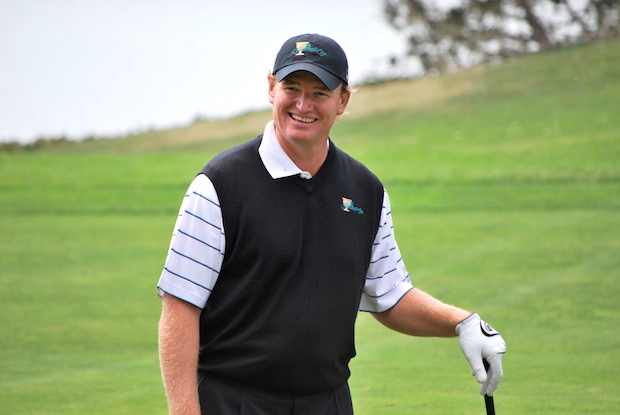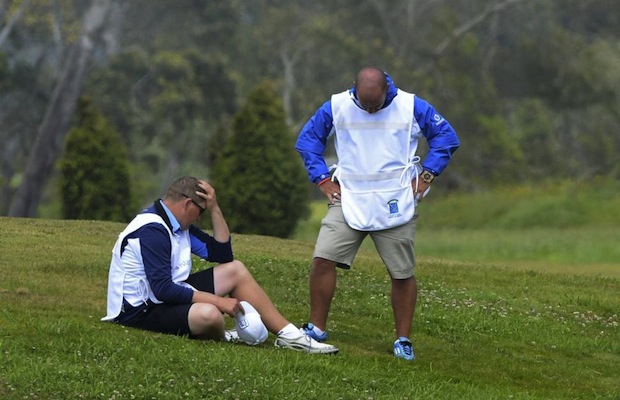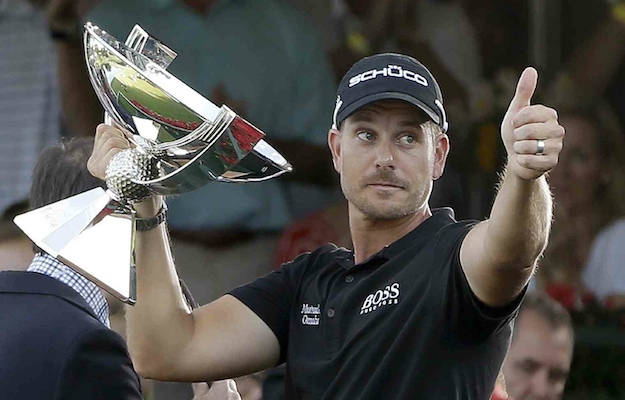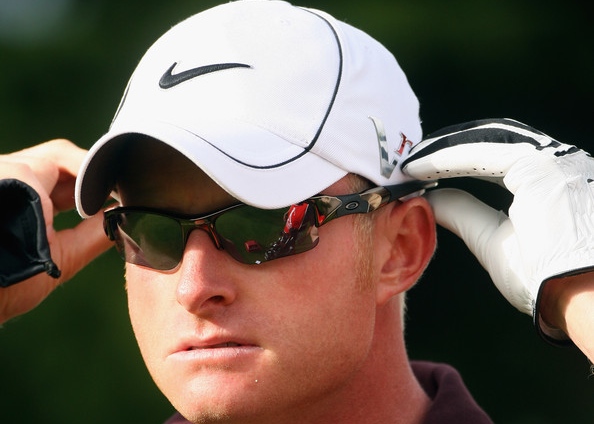Opinion & Analysis
Els gives up cash to make a point to the European Tour

There’s not much that upsets the “Big Easy,” but European Tour officials have done just that.
The four-time major champion has decided to skip next week’s DP World Tour Championship in Dubai in protest to of new European Tour rules requiring its members to play two out of the three of the events leading up the season finale in order to remain eligible for the first prize of $8 million. The three tournaments in question are the BMW Masters in Shanghai, the WGC-HSBC Champions tournament that ended in Shanghai on Sunday (Els finished T11) and this week’s Turkish Airlines Open.
“It’s farcical,” Els said. “In my view it’s an absolute joke I can see [the tour’s point of view] but it’s crazy. I’ve been playing both tours since 1994 and it’s been no problem but for some reason now the European Tour expect us to play a full schedule.
“We used to play seven events and you could keep your card in Europe. Now you have to play more than in America. [That is] the direction they’re going in. I just think it’s the wrong one.
“I’m going to have to look at my schedule. I was there for the growth of this tour, 22 years, and now they’re making it almost impossible for me… to remain playing the tour.”
The decision appears to be a tough one given the European Tour’s struggles in recent years to retain some of its top young European players. Most of these players have been heading off to the richer PGA Tour, where larger prize money is offered.World No. 2 and current Masters champion Adam Scott is one player that gave up his membership several years ago to play primarily on the PGA Tour and tournaments back home in Australia.
Though it’s doubtful the European Tour will alter its decision for any one player, the possible loss of a crowd favorite like Els would be a huge embarrassment.
When Els was asked how European Tour officials reacted to the news he would not be playing in Dubai, Els had this to say:
“I don’t think they really care.”
Harsh words, but perhaps Els’ no show will send a more powerful message.
Opinion & Analysis
The 2 primary challenges golf equipment companies face

As the editor-in-chief of this website and an observer of the GolfWRX forums and other online golf equipment discourse for over a decade, I’m pretty well attuned to the grunts and grumbles of a significant portion of the golf equipment purchasing spectrum. And before you accuse me of lording above all in some digital ivory tower, I’d like to offer that I worked at golf courses (public and private) for years prior to picking up my pen, so I’m well-versed in the non-degenerate golf equipment consumers out there. I touched (green)grass (retail)!
Complaints about the ills of and related to the OEMs usually follow some version of: Product cycles are too short for real innovation, tour equipment isn’t the same as retail (which is largely not true, by the way), too much is invested in marketing and not enough in R&D, top staffer X hasn’t even put the new driver in play, so it’s obviously not superior to the previous generation, prices are too high, and on and on.
Without digging into the merits of any of these claims, which I believe are mostly red herrings, I’d like to bring into view of our rangefinder what I believe to be the two primary difficulties golf equipment companies face.
One: As Terry Koehler, back when he was the CEO of Ben Hogan, told me at the time of the Ft Worth irons launch, if you can’t regularly hit the golf ball in a coin-sized area in the middle of the face, there’s not a ton that iron technology can do for you. Now, this is less true now with respect to irons than when he said it, and is less and less true by degrees as the clubs get larger (utilities, fairways, hybrids, drivers), but there remains a great deal of golf equipment truth in that statement. Think about it — which is to say, in TL;DR fashion, get lessons from a qualified instructor who will teach you about the fundamentals of repeatable impact and how the golf swing works, not just offer band-aid fixes. If you can’t repeatably deliver the golf club to the golf ball in something resembling the manner it was designed for, how can you expect to be getting the most out of the club — put another way, the maximum value from your investment?
Similarly, game improvement equipment can only improve your game if you game it. In other words, get fit for the clubs you ought to be playing rather than filling the bag with the ones you wish you could hit or used to be able to hit. Of course, don’t do this if you don’t care about performance and just want to hit a forged blade while playing off an 18 handicap. That’s absolutely fine. There were plenty of members in clubs back in the day playing Hogan Apex or Mizuno MP-32 irons who had no business doing so from a ballstriking standpoint, but they enjoyed their look, feel, and complementary qualities to their Gatsby hats and cashmere sweaters. Do what brings you a measure of joy in this maddening game.
Now, the second issue. This is not a plea for non-conforming equipment; rather, it is a statement of fact. USGA/R&A limits on every facet of golf equipment are detrimental to golf equipment manufacturers. Sure, you know this, but do you think about it as it applies to almost every element of equipment? A 500cc driver would be inherently more forgiving than a 460cc, as one with a COR measurement in excess of 0.83. 50-inch shafts. Box grooves. And on and on.
Would fewer regulations be objectively bad for the game? Would this erode its soul? Fortunately, that’s beside the point of this exercise, which is merely to point out the facts. The fact, in this case, is that equipment restrictions and regulations are the slaughterbench of an abundance of innovation in the golf equipment space. Is this for the best? Well, now I’ve asked the question twice and might as well give a partial response, I guess my answer to that would be, “It depends on what type of golf you’re playing and who you’re playing it with.”
For my part, I don’t mind embarrassing myself with vintage blades and persimmons chasing after the quasi-spiritual elevation of a well-struck shot, but that’s just me. Plenty of folks don’t give a damn if their grooves are conforming. Plenty of folks think the folks in Liberty Corner ought to add a prison to the museum for such offences. And those are just a few of the considerations for the amateur game — which doesn’t get inside the gallery ropes of the pro game…
Different strokes in the game of golf, in my humble opinion.
Anyway, I believe equipment company engineers are genuinely trying to build better equipment year over year. The marketing departments are trying to find ways to make this equipment appeal to the broadest segment of the golf market possible. All of this against (1) the backdrop of — at least for now — firm product cycles. And golfers who, with their ~15 average handicap (men), for the most part, are not striping the golf ball like Tiger in his prime and seem to have less and less time year over year to practice and improve. (2) Regulations that massively restrict what they’re able to do…
That’s the landscape as I see it and the real headwinds for golf equipment companies. No doubt, there’s more I haven’t considered, but I think the previous is a better — and better faith — point of departure when formulating any serious commentary on the golf equipment world than some of the more cynical and conspiratorial takes I hear.
Agree? Disagree? Think I’m worthy of an Adam Hadwin-esque security guard tackle? Let me know in the comments.
@golfoncbs The infamous Adam Hadwin tackle ? #golf #fyp #canada #pgatour #adamhadwin ? Ghibli-style nostalgic waltz – MaSssuguMusic
Podcasts
Fore Love of Golf: Introducing a new club concept

Episode #16 brings us Cliff McKinney. Cliff is the founder of Old Charlie Golf Club, a new club, and concept, to be built in the Florida panhandle. The model is quite interesting and aims to make great, private golf more affordable. We hope you enjoy the show!
Opinion & Analysis
On Scottie Scheffler wondering ‘What’s the point of winning?’

Last week, I came across a reel from BBC Sport on Instagram featuring Scottie Scheffler speaking to the media ahead of The Open at Royal Portrush. In it, he shared that he often wonders what the point is of wanting to win tournaments so badly — especially when he knows, deep down, that it doesn’t lead to a truly fulfilling life.
View this post on Instagram
“Is it great to be able to win tournaments and to accomplish the things I have in the game of golf? Yeah, it brings tears to my eyes just to think about it because I’ve literally worked my entire life to be good at this sport,” Scheffler said. “To have that kind of sense of accomplishment, I think, is a pretty cool feeling. To get to live out your dreams is very special, but at the end of the day, I’m not out here to inspire the next generation of golfers. I’m not out here to inspire someone to be the best player in the world, because what’s the point?”
Ironically — or perhaps perfectly — he went on to win the claret jug.
That question — what’s the point of winning? — cuts straight to the heart of the human journey.
As someone who’s spent over two decades in the trenches of professional golf, and in deep study of the mental, emotional, and spiritual dimensions of the game, I see Scottie’s inner conflict as a sign of soul evolution in motion.
I came to golf late. I wasn’t a junior standout or college All-American. At 27, I left a steady corporate job to see if I could be on the PGA Tour starting as a 14-handicap, average-length hitter. Over the years, my journey has been defined less by trophies and more by the relentless effort to navigate the deeply inequitable and gated system of professional golf — an effort that ultimately turned inward and helped me evolve as both a golfer and a person.
One perspective that helped me make sense of this inner dissonance around competition and our culture’s tendency to overvalue winning is the idea of soul evolution.
The University of Virginia’s Division of Perceptual Studies has done extensive research on reincarnation, and Netflix’s Surviving Death (Episode 6) explores the topic, too. Whether you take it literally or metaphorically, the idea that we’re on a long arc of growth — from beginner to sage elder — offers a profound perspective.
If you accept the premise literally, then terms like “young soul” and “old soul” start to hold meaning. However, even if we set the word “soul” aside, it’s easy to see that different levels of life experience produce different worldviews.
Newer souls — or people in earlier stages of their development — may be curious and kind but still lack discernment or depth. There is a naivety, and they don’t yet question as deeply, tending to see things in black and white, partly because certainty feels safer than confronting the unknown.
As we gain more experience, we begin to experiment. We test limits. We chase extreme external goals — sometimes at the expense of health, relationships, or inner peace — still operating from hunger, ambition, and the fragility of the ego.
It’s a necessary stage, but often a turbulent and unfulfilling one.
David Duval fell off the map after reaching World No. 1. Bubba Watson had his own “Is this it?” moment with his caddie, Ted Scott, after winning the Masters.
In Aaron Rodgers: Enigma, reflecting on his 2011 Super Bowl win, Rodgers said:
“Now I’ve accomplished the only thing that I really, really wanted to do in my life. Now what? I was like, ‘Did I aim at the wrong thing? Did I spend too much time thinking about stuff that ultimately doesn’t give you true happiness?’”
Jim Carrey once said, “I think everybody should get rich and famous and do everything they ever dreamed of so they can see that it’s not the answer.”
Eventually, though, something shifts.
We begin to see in shades of gray. Winning, dominating, accumulating—these pursuits lose their shine. The rewards feel more fleeting. Living in a constant state of fight-or-flight makes us feel alive, yes, but not happy and joyful.
Compassion begins to replace ambition. Love, presence, and gratitude become more fulfilling than status, profits, or trophies. We crave balance over burnout. Collaboration over competition. Meaning over metrics.
Interestingly, if we zoom out, we can apply this same model to nations and cultures. Countries, like people, have a collective “soul stage” made up of the individuals within them.
Take the United States, for example. I’d place it as a mid-level soul: highly competitive and deeply driven, but still learning emotional maturity. Still uncomfortable with nuance. Still believing that more is always better. Despite its global wins, the U.S. currently ranks just 23rd in happiness (as of 2025). You might liken it to a gifted teenager—bold, eager, and ambitious, but angsty and still figuring out how to live well and in balance. As much as a parent wants to protect their child, sometimes the child has to make their own mistakes to truly grow.
So when Scottie Scheffler wonders what the point of winning is, I don’t see someone losing strength.
I see someone evolving.
He’s beginning to look beyond the leaderboard. Beyond metrics of success that carry a lower vibration. And yet, in a poetic twist, Scheffler did go on to win The Open. But that only reinforces the point: even at the pinnacle, the question remains. And if more of us in the golf and sports world — and in U.S. culture at large — started asking similar questions, we might discover that the more meaningful trophy isn’t about accumulating or beating others at all costs.
It’s about awakening and evolving to something more than winning could ever promise.
















Mark
Nov 9, 2013 at 5:37 am
You can bet your Bottom Dollar that if Els still resided in Wentworth, England. He would not be in this situation, Els moved to Florida to take up a Full time Playing position on the PGA tour, so did McCilroy, Westwood, Poulter and they still managed to play in enough events to Qualify for Dubai.
The Pga Tour have a similar system to make sure that the top 30 going in to the last event of the Fed Ex Cup are the only one’s who have a chance of winning the big pot, The European Tour are just making sure that its the same over here, Judging by the Golf being played in Turkey this week, Els won’t be missed.
Neale
Nov 9, 2013 at 11:45 pm
Mark – the main reason for Ernie moving to live in Florida was to provide his son Ben with the treatment and facilities for his autism which Europe was not able to offer. Yes, there were also other considerations but Ernie, like other players has continued to support the European tour.
GSark
Nov 6, 2013 at 10:03 pm
When the U.S tour was clearly No.1 this would have been no issue. Now that line has been blurred and the Europeans are clearly No.1 ( look at the Ryder cup)I totally understand the officials tightening up the qualifications. This is a competition after all and right now the best players in the world are from Europe and by default that makes their tour No.1. You can argue and talk about prize money, or you can look at the Ryder Cup and the decimation the Europeans rain down on the Americans year after year. They’ve earned the right to be picky. Tough noogies Ernie.
naflack
Nov 8, 2013 at 3:24 pm
But they don’t play that tour…
The Ryder cup has zero implications on which tour is held in higher regard. I don’t have an issue with the euro tours demands even though I don’t think it will work but the Ryder cup had nothing to do with any of this.
B
Nov 6, 2013 at 1:49 pm
Ernie is quickly becoming a farcical character in golf. The sooner he realized that the days of being spoiled in golf are over and that the world’s tours are becoming more competitive and therefore are wanting to set them up as true competitions whereby point must be attained in fair game situations, the better he will be.
But then again, it might be OK for somebody like him to quit playing as well, so that youngsters who want to compete and gain status fair and square can do so in properly-sanctioned competitions by getting points from them.
Buh-bye Ernie.
Andreas
Nov 6, 2013 at 1:24 pm
What people don’t realise is that the UK taxman wants to tax the winnings (fair enough I suppose) but he also wants a share of endorsements. So if Tiger Woods is getting $10M from Nike per year the UK wants a portion of that for the 4 days he spends playing the British Open. They are effectively getting taxed twice at their home country and by the UK.
Now, Tiger has more than enough but what this is doing for all sports is putting the UK at the bottom of the list when it coming to hosting ANY sporting events and that’s why there is no WGC in the UK. Guys just don’t want to play
AJ
Nov 6, 2013 at 7:40 am
Most top European pros now base themselves in Florida because they can practice all year round. Before they did this, they were effectively competing on an un-even playing field because their USA competitors could practice more regularly.
Els famously used to live on the Wentworth Estate – lovely place yes but poor weather for at least 3 and sometimes 6 months of the year. He has now moved to the US – why then is he so fussed about keeping ET membership?
Then the European (or British) commentators and media criticise these players (inc top Euros such as McIlroy, Poulter, McDowell, Rose) for leaving their ‘home’ tour when all they are trying to do is compete with the other top players in the world. The plan is clearly working given recent Euro successes in the majors and of course the Ryder Cup dominance over the past decade.
Personally, as an Englishman, I wish a World Tour or something would be instigated and more top events (with all the top Americans) would be played over here in our summer (around the Open) – call it a European swing or whatever. However, why would the PGA Tour ever agree to this – they have a huge home-grown fan base and multiple sponsors putting on fantastic events that over here we love watching in the evenings.
The European Tour is destined to become an effective feeder tour (if it isn’t already) and should stop trying to compete on a level playing field. As others have pointed out, the move to Dubai/Asia-based events has led to somewhat of a farce anyway.
leftright
Nov 7, 2013 at 8:41 am
The “World” tour is coming and coming fast. That is what the top players will be doing in 10 years is jumping from country to country playing top level events for huge sums of money. There will be a PGA and European Tour but the tournaments for the most part will be like second level events e.g., those opposite the Master’s or British Open that draw lesser fields. Conceivably you could have someone like Tiger (it won’t be Tiger) playing 5 events on the PGA Tour, all majors and maybe the player’s.
Troy Vayanos
Nov 6, 2013 at 4:32 am
I like Mat’s comments on having equal points across both tours. I think there is some merit in that.
I agree with Kevin that a world tour would be the best way to go. Something similar to what is in place in professional tennis. However I cannot see anything like this happening for quite some time as the PGA Tour is very strong and has no reason to share or combine with the European Tour.
naflack
Nov 5, 2013 at 6:30 pm
The European tour should just embrace number 2. Invite more of the American college players to come over and gain status professionally and use it as a reason to have smaller payouts.
That’s my opinion anyway?
alex
Nov 5, 2013 at 9:53 pm
yes, I think that’s the way to go
pablo
Nov 6, 2013 at 7:42 pm
+1
K
Nov 8, 2013 at 1:38 pm
+2
Mat
Nov 5, 2013 at 6:28 pm
It would be wise for the tours to have “exchange” points… somehow get a system where you have a top 125, but that if the European tour offered a card for 50¢/$ US as credit towards a card, your good euro players can play any time. Those that are talented but not playing both tours would have incentive to stay, but would still allow the top stars from the USPGA to play in Europe on demand.
OTOH, it may well be what preserves interest in the events leading to a big payoff — and if Els wanted to play for that money, he should have looked at it as a multi-event purse.
You have to decide if you want the Top 10 to go poach a huge purse on a one-week shot, or do you want to have a separate-and-almost-equal tour not in USA.
Kevin
Nov 5, 2013 at 5:31 pm
It’s time they just introduced a world tour , as one other has said the European Tour travels all over the world apart from the US and Austrailia
Derehk
Nov 9, 2013 at 3:59 am
European Tour makes six stops in US and one in Australia during 2013 season.
Danny
Nov 5, 2013 at 4:57 pm
The European Tour is only useful for filling time on the golf channel if there are no PGA events that week.
Also, why is it the European tour when most of their tournements are not in Europe. Last time I checked Dubai is in Asia.
Mikko U
Nov 5, 2013 at 5:41 pm
Really funny Danny.
As for the comments Els made, I think it’s quite sad actually. You need to play in 12 ET tournaments, 4 majors and 4 WGC tournaments are on everyone’s calendar.
That leaves 4 tournaments you need to play specially on ET. If you play only two of the pre-Dubai tournaments and another one of them is the WGC, it still adds up to two tournaments in the whole DP finals-series. So, finally you have 2 tournaments that are outside of the majors, WGC or Dubai-finals, which most top pros will play anyway.
Two tournaments really isn’t that much, throw in the Scottish Open the week before the Open and you’re left with one, for Els that could be a tournament in his home land SA. Maybe that’s too much to ask for.
The question is, why does Els want to have the ET card if playing a couple of tournaments on ET is too much?
Brian
Nov 5, 2013 at 5:45 pm
Softer competition and the chance to sneak in and pick up some potential extra cash with a win.
Mikko U
Nov 5, 2013 at 6:41 pm
Yes but clearly he doesn’t seem to have interest in sneaking in to play a tournament or two because he thinks it’s too much to ask to play those couple of extra tournaments. Thus that can’t be the answer.
neil
Nov 6, 2013 at 6:15 am
not sure it is Asia,more like Middle east?
cce
Nov 6, 2013 at 6:56 am
Please check a map. Middle East Asia is where Dubai is. Still Asia.
Whatsthepoint
Nov 6, 2013 at 10:46 am
Danny, that is one of the dumbest comments I’ve ever read. Why do you post here? You know nothing about golf